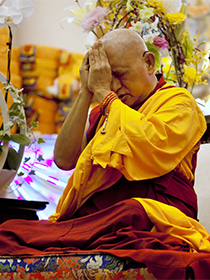- Home
- FPMT Homepage
Foundation for the Preservation of the Mahayana Tradition
The FPMT is an organization devoted to preserving and spreading Mahayana Buddhism worldwide by creating opportunities to listen, reflect, meditate, practice and actualize the unmistaken teachings of the Buddha and based on that experience spreading the Dharma to sentient beings. We provide integrated education through which people’s minds and hearts can be transformed into their highest potential for the benefit of others, inspired by an attitude of universal responsibility and service. We are committed to creating harmonious environments and helping all beings develop their full potential of infinite wisdom and compassion. Our organization is based on the Buddhist tradition of Lama Tsongkhapa of Tibet as taught to us by our founders Lama Thubten Yeshe and Lama Thubten Zopa Rinpoche.
- Willkommen
Die Stiftung zur Erhaltung der Mahayana Tradition (FPMT) ist eine Organisation, die sich weltweit für die Erhaltung und Verbreitung des Mahayana-Buddhismus einsetzt, indem sie Möglichkeiten schafft, den makellosen Lehren des Buddha zuzuhören, über sie zur reflektieren und zu meditieren und auf der Grundlage dieser Erfahrung das Dharma unter den Lebewesen zu verbreiten.
Wir bieten integrierte Schulungswege an, durch denen der Geist und das Herz der Menschen in ihr höchstes Potential verwandelt werden zum Wohl der anderen – inspiriert durch eine Haltung der universellen Verantwortung und dem Wunsch zu dienen. Wir haben uns verpflichtet, harmonische Umgebungen zu schaffen und allen Wesen zu helfen, ihr volles Potenzial unendlicher Weisheit und grenzenlosen Mitgefühls zu verwirklichen.
Unsere Organisation basiert auf der buddhistischen Tradition von Lama Tsongkhapa von Tibet, so wie sie uns von unseren Gründern Lama Thubten Yeshe und Lama Thubten Zopa Rinpoche gelehrt wird.
- Bienvenidos
La Fundación para la preservación de la tradición Mahayana (FPMT) es una organización que se dedica a preservar y difundir el budismo Mahayana en todo el mundo, creando oportunidades para escuchar, reflexionar, meditar, practicar y actualizar las enseñanzas inconfundibles de Buda y en base a esa experiencia difundir el Dharma a los seres.
Proporcionamos una educación integrada a través de la cual las mentes y los corazones de las personas se pueden transformar en su mayor potencial para el beneficio de los demás, inspirados por una actitud de responsabilidad y servicio universales. Estamos comprometidos a crear ambientes armoniosos y ayudar a todos los seres a desarrollar todo su potencial de infinita sabiduría y compasión.
Nuestra organización se basa en la tradición budista de Lama Tsongkhapa del Tíbet como nos lo enseñaron nuestros fundadores Lama Thubten Yeshe y Lama Zopa Rinpoche.
A continuación puede ver una lista de los centros y sus páginas web en su lengua preferida.
- Bienvenue
L’organisation de la FPMT a pour vocation la préservation et la diffusion du bouddhisme du mahayana dans le monde entier. Elle offre l’opportunité d’écouter, de réfléchir, de méditer, de pratiquer et de réaliser les enseignements excellents du Bouddha, pour ensuite transmettre le Dharma à tous les êtres. Nous proposons une formation intégrée grâce à laquelle le cœur et l’esprit de chacun peuvent accomplir leur potentiel le plus élevé pour le bien d’autrui, inspirés par le sens du service et une responsabilité universelle. Nous nous engageons à créer un environnement harmonieux et à aider tous les êtres à épanouir leur potentiel illimité de compassion et de sagesse. Notre organisation s’appuie sur la tradition guéloukpa de Lama Tsongkhapa du Tibet, telle qu’elle a été enseignée par nos fondateurs Lama Thoubtèn Yéshé et Lama Zopa Rinpoché.
Visitez le site de notre Editions Mahayana pour les traductions, conseils et nouvelles du Bureau international en français.
Voici une liste de centres et de leurs sites dans votre langue préférée
- Benvenuto
L’FPMT è un organizzazione il cui scopo è preservare e diffondere il Buddhismo Mahayana nel mondo, creando occasioni di ascolto, riflessione, meditazione e pratica dei perfetti insegnamenti del Buddha, al fine di attualizzare e diffondere il Dharma fra tutti gli esseri senzienti.
Offriamo un’educazione integrata, che può trasformare la mente e i cuori delle persone nel loro massimo potenziale, per il beneficio di tutti gli esseri, ispirati da un’attitudine di responsabilità universale e di servizio.
Il nostro obiettivo è quello di creare contesti armoniosi e aiutare tutti gli esseri a sviluppare in modo completo le proprie potenzialità di infinita saggezza e compassione.
La nostra organizzazione si basa sulla tradizione buddhista di Lama Tsongkhapa del Tibet, così come ci è stata insegnata dai nostri fondatori Lama Thubten Yeshe e Lama Zopa Rinpoche.
Di seguito potete trovare un elenco dei centri e dei loro siti nella lingua da voi prescelta.
- 欢迎 / 歡迎
简体中文
“护持大乘法脉基金会”( 英文简称:FPMT。全名:Foundation for the Preservation of the Mahayana Tradition) 是一个致力于护持和弘扬大乘佛法的国际佛教组织。我们提供听闻,思维,禅修,修行和实证佛陀无误教法的机会,以便让一切众生都能够享受佛法的指引和滋润。
我们全力创造和谐融洽的环境, 为人们提供解行并重的完整佛法教育,以便启发内在的环宇悲心及责任心,并开发内心所蕴藏的巨大潜能 — 无限的智慧与悲心 — 以便利益和服务一切有情。
FPMT的创办人是图腾耶喜喇嘛和喇嘛梭巴仁波切。我们所修习的是由两位上师所教导的,西藏喀巴大师的佛法传承。
繁體中文
護持大乘法脈基金會”( 英文簡稱:FPMT。全名:Found
ation for the Preservation of the Mahayana Tradition ) 是一個致力於護持和弘揚大乘佛法的國際佛教組織。我們提供聽聞, 思維,禪修,修行和實證佛陀無誤教法的機會,以便讓一切眾生都能 夠享受佛法的指引和滋潤。 我們全力創造和諧融洽的環境,
為人們提供解行並重的完整佛法教育,以便啟發內在的環宇悲心及責 任心,並開發內心所蘊藏的巨大潛能 — 無限的智慧與悲心 – – 以便利益和服務一切有情。 FPMT的創辦人是圖騰耶喜喇嘛和喇嘛梭巴仁波切。
我們所修習的是由兩位上師所教導的,西藏喀巴大師的佛法傳承。 察看道场信息:
- FPMT Homepage
- News/Media
-
- Study & Practice
-
-
- About FPMT Education Services
- Latest News
- Programs
- New to Buddhism?
- Buddhist Mind Science: Activating Your Potential
- Heart Advice for Death and Dying
- Discovering Buddhism
- Living in the Path
- Exploring Buddhism
- FPMT Basic Program
- FPMT Masters Program
- FPMT In-Depth Meditation Training
- Maitripa College
- Lotsawa Rinchen Zangpo Translator Program
- Universal Education for Compassion & Wisdom
- Online Learning Center
-
- Prayers & Practice Materials
- Overview of Prayers & Practices
- Full Catalogue of Prayers & Practice Materials
- Explore Popular Topics
- Benefiting Animals
- Chenrezig Resources
- Death & Dying Resources
- Lama Chopa (Guru Puja)
- Lama Zopa Rinpoche: Compendium of Precious Instructions
- Lama Zopa Rinpoche: Life Practice Advice
- Lama Zopa Rinpoche Practice Series
- Lamrim Resources
- Mantras
- Prayer Book Updates
- Purification Practices
- Sutras
- Thought Transformation (Lojong)
- Audio Materials
- Dharma Dates - Tibetan Calendar
- Translation Services
- Publishing Services
- Ways to Offer Support
- Prayers & Practice Materials
-
- Teachings and Advice
- Find Teachings and Advice
- Lama Zopa Rinpoche Advice Page
- Lama Zopa Rinpoche: Compendium of Precious Instructions
- Lama Zopa Rinpoche Video Teachings
- ༧སྐྱབས་རྗེ་བཟོད་པ་རིན་པོ་ཆེ་མཆོག་ནས་སྩལ་བའི་བཀའ་སློབ་བརྙན་འཕྲིན།
- Podcasts
- Lama Yeshe Wisdom Archive
- Buddhism FAQ
- Dharma for Young People
- Resources on Holy Objects
- Teachings and Advice
-
-
*If a menu item has a submenu clicking once will expand the menu clicking twice will open the page.
-
-
- Centers
-
- Teachers
-
- Projects
-
-
-
-
*If a menu item has a submenu clicking once will expand the menu clicking twice will open the page.
-
-
- FPMT
-
- Shop
-
-
-
The Foundation Store is FPMT’s online shop and features a vast selection of Buddhist study and practice materials written or recommended by our lineage gurus. These items include homestudy programs, prayers and practices in PDF or eBook format, materials for children, and other resources to support practitioners.
Items displayed in the shop are made available for Dharma practice and educational purposes, and never for the purpose of profiting from their sale. Please read FPMT Foundation Store Policy Regarding Dharma Items for more information.
-
-
22
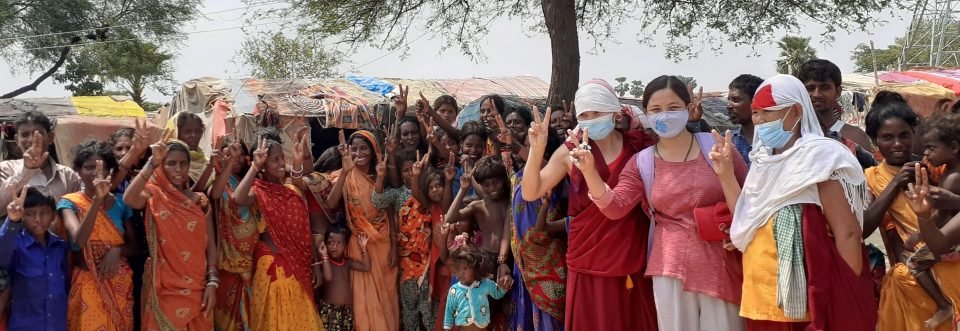
Food distribution in Barachati Village, Bihar State, India, June 2020. Photo by Samten Dolma Bhutia.
Root Institute for Wisdom Culture, the FPMT center in Bodhgaya, Bihar State, India, has been distributing daily staples and food to local poor people and migrant laborers returning to their villages due to the COVID-19 pandemic. Community service is one of FPMT’s Five Pillars of Service. Samten Dolma Bhutia, center manager, shares the story.
Root Institute had the wish to offer service during the COVID-19 pandemic, especially in our state of Bihar, one of the poorest states in India with a high volume of migrant workers. The merit-multiplying month of Saka Dawa helped us set this course into action.
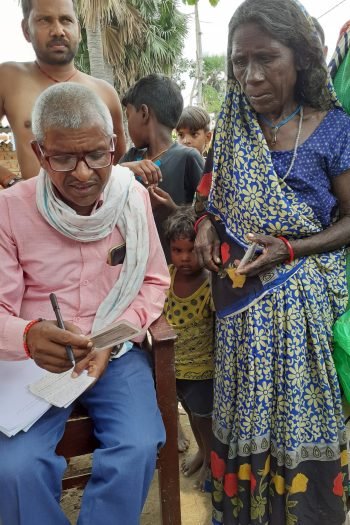
Village representative Vijay Paswan helping with a survey in Ghongwa Village, Bihar State, India, June 2020. Photo by Samten Dolma Bhutia.
By the blessing of Lama Zopa Rinpoche (please read Rinpoche’s message on this project), we began distributing food in May, funded by Root Institute. In June 2020, we received a donation from the Tzu Chi Foundation in Taiwan for food distribution around the Buddhist holy sites of Bodhgaya and Sarnath, and began distributing food on their behalf on June 5.
Two nuns, Ani Lhundrup Doma and Ani Tsangmo; Mr. Pema Tsering, Maitreya School principal; and Root Institute staff lent their kind assistance. We distributed 206 bags of food on the first day.
We sought the help of Father Lawrence, who familiarized us with the poorest village. Father Lawrence is a Jesuit priest who runs a school and missionary project in Bodhgaya and the surrounding area. Their church members surveyed the villages they are connected to and collected their clients’ names from their database.
They surveyed the first village we would distribute to, a remote village named Barachati, and made a list of 160 names. We had extra bags left over after visiting Barachati, so we distributed them to the Romani Indians who live in tents by the roadside.
Root staff members, including Mr. Pema Tsering, suggested that we conduct a survey on our own with the help of our staff. The next day Pema-la asked Umesh, our bus conductor, to take us to his village. Umesh was happy to help us with this survey.
When we go for a survey, we note down the names of the villagers and their identity numbers and give them coupons. The next day, when we do the food distribution, the villagers bring their coupons and identity cards, and we check our list and get their signatures to assure that all the names listed get a food bag.
We go from house to house, collecting their names from their identity card and noting down the identity number. (There could be many people with the same name, but identity numbers are unique.) Our purpose for going house to house or having a village representative help us is because not everyone in the village is poor. There are some who own land and a farm tractor and are not in dire need of food, and in some cases three or four members come from the same family for food, when we don’t visit house to house.
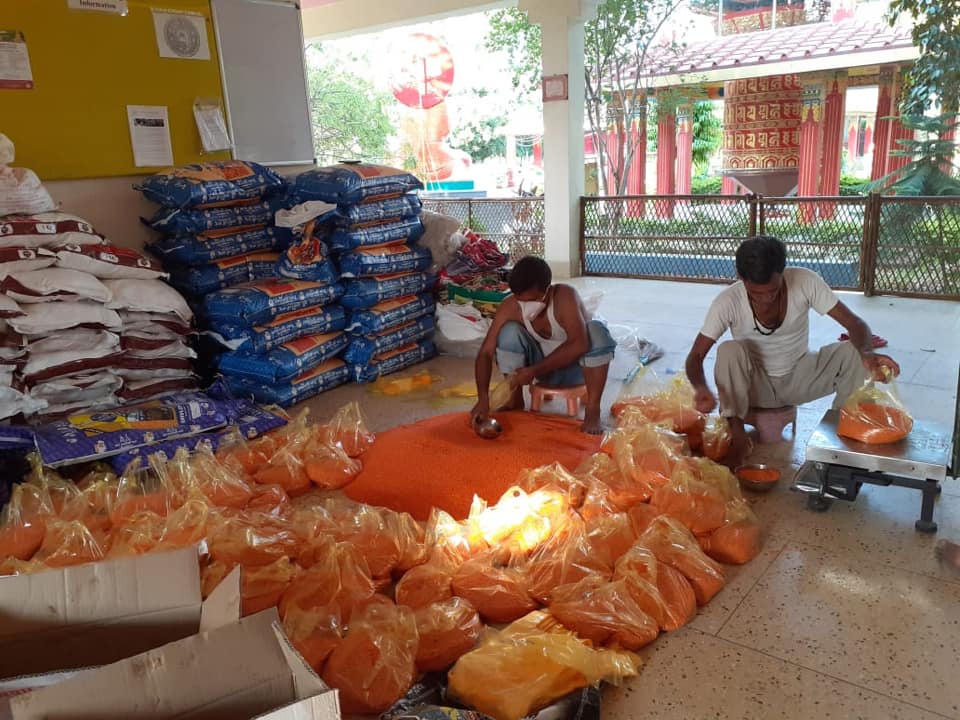
MD Shahid and Binod packaging food at Root Institute, Bodhgaya, Bihar, India, June 2020. Photo by Samten Dolma Bhutia.
Pema, Umesh, and I went by scooter to Illara, Umesh’s village, and the nearby village of Bandha. All together we collected 129 names. The next day we packed 129 bags of food and left Root to distribute food to Illara and Bandha Villages.
Our director contacted Ladakhi monk Anand Bhantey ji and asked him to help us find another village. He came the next day, picked up Shahid and I, and took us to a village named Phur Phuri. Anand Bhantey ji had helped these villagers make a tent to shelter them from rain and heat, and helped them with food as well. He also has plans to educate the children.
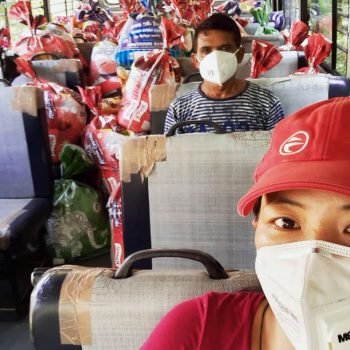
MD Shahid and Samten Dolma Bhutia on a Maitreya School bus delivering food to villages, Bihar State, India, June 2020. Photo by Samten Dolma Bhutia.
The people of Phur Phuri Village don’t have anything — not even identity documents. Because of this they cannot access all of the provisions provided by the government. It would have been very hard for us to find this village without Anand Bhantey ji because they live in an area inaccessible by vehicles.
When we reached Phur Puri the people were so happy to welcome Anand Bhantey ji. They greeted Anand Bhantey ji, Shahid, and I by saying, “Namaste Guru ji.” There were 51 families, and we collected their names.
Most of the women of Phur Phuri Village are teenagers, cooking, cleaning, and looking after their children. Phur Phuri villagers belong to Musar, the lowest caste in the caste hierarchy. They live on whatever they can get in their daily lives, such as wages earned by carrying loads or by hunting rats in paddy fields. They seemed to us to be cheerful and hardworking. We distributed 51 bags of food in this village. This totaled 386 food bags distributed in the community on behalf of Root Institute.
On July 6, I revisited this village again to distribute clothing to the children, sponsored by my kind friend Kumphen, who has also helped with Root Institute activities and social service projects.
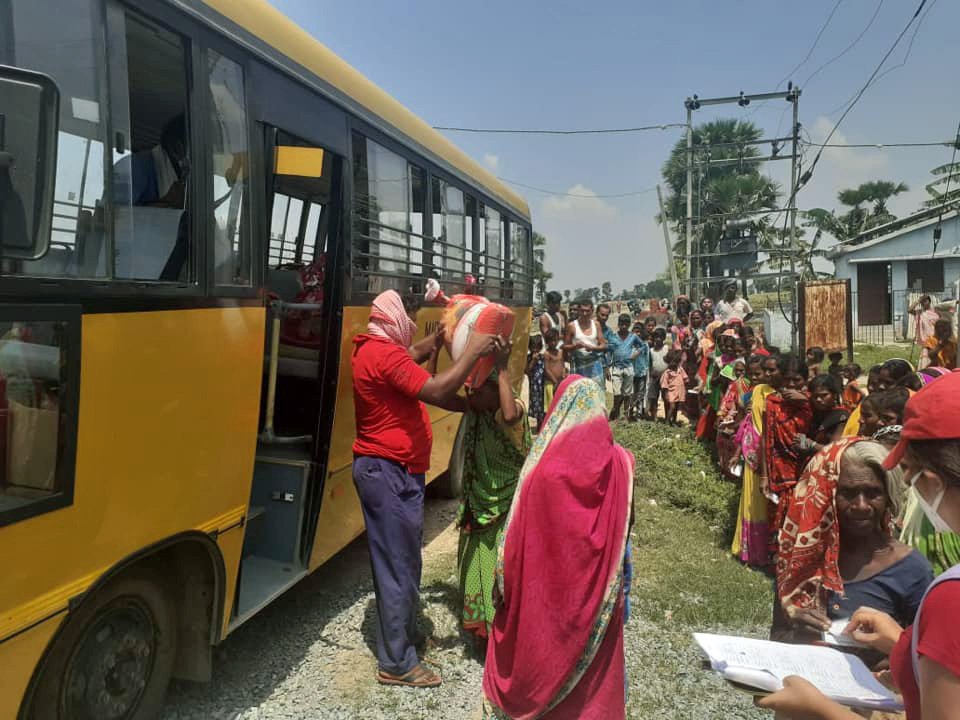
Samten Dolma Bhutia collecting coupons and signatures from the villagers while Shatrudan offers bags of food in Bandha Village, Bihar State, India, June 2020. Photo by MD Shahid.
Surveying was the most overwhelming phase of our work as it was during this period that we met villagers and encountered their lives in the village. Our hearts were particularly touched by the elderly people living in mud houses and still struggling to obtain their basic needs. As we conducted surveys we were assisted by a village leader or an active member of the village due to their familiarity with the people.
After conducting the surveys we made many food distribution trips, offering bags of food to 140 families in Kundali Village, 193 families in Baighanbigha Village, 69 families in Sihodavatad Village, 86 families in lalita Ganj Village, 98 families in Sukandih Village, 24 families in Gaya Krimganj Village, and 101 families in Cherki Village. In sum, we reached 711 families.
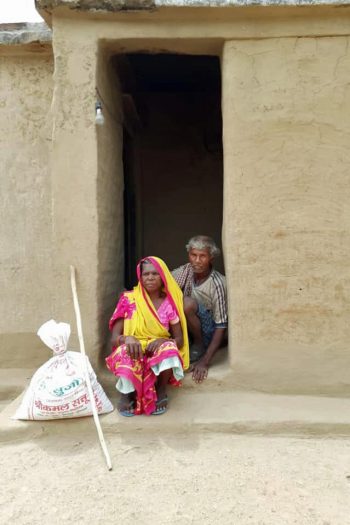
Barachati Village, Bihar State, India, June 2020. Photo by Samten Dolma Bhutia.
We had identified 224 more people in need of food assistance from Dab Manshidi and Godwadi Villages, but we had to stop delivering food before we could reach them due to a sudden and total lockdown beginning on July 16, due to increasing numbers of COVID-19 cases in Bihar.
Finally, on September 13, we were able to distribute food to these communities. As our school buses were not allowed to move around, we distributed the food by asking village heads to bring their farm tractors to Root Institute. Dinesh Kumar, the Navidih Village headman, came to Root Institute with a farm tractor and auto rickshaw to pick up food distribution sacks. Then Tashi-la, Mahakala Cave manager; Kishori, Maitreya School staff; and Raj Kumar, Gopa, and I from Root went to the villages with Dinesh to distribute the food to the people on our list from the surveys. Although we had collected the names of 224 people from Dab Manshidi and Godwadi Villages before the lockdown, by September only 208 bags were distributed as some people had left the village.
The following day we took the remaining 15 sacks of food to Veda Orphan Old Age Home in Bodhgaya, where we distributed 13 bags. We gave the remaining 2 bags to the people we met on the way back to Root Institute.
We have not yet completed our food distribution project on behalf of the Tzu Chi Charitable Foundation. We will be going out to distribute food in the future when the time is good for us to do so.
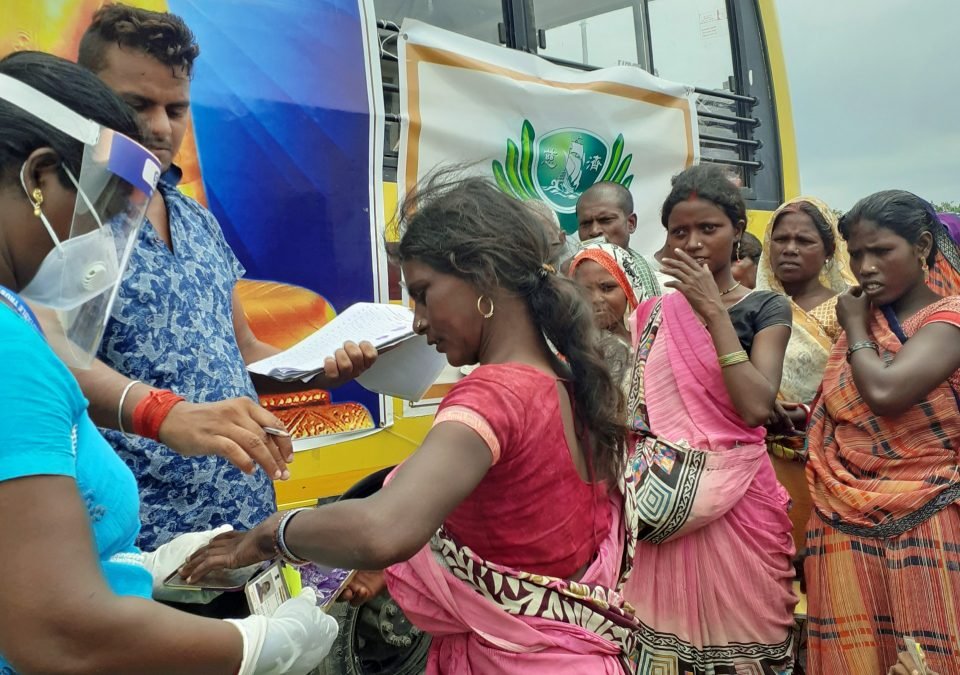
Lucy Khujur and village representative Ravi helping with food distribution in Sukhandi Village, Bihar State, India, July 2020. Photo by Samten Dolma Bhutia.
We are grateful to Lama Zopa Rinpoche and feel blessed to have been able to distribute food to people in need. With Rinpoche’s blessings we were able to reduce our fear. When we see others suffering it helps us forget our own suffering. Thank you to the many benefactors who have so generously benefitted the poor laborers struggling to meet their basic needs. Thanks to their generosity, we were able to help others, thereby collecting merit and purifying negative karma.
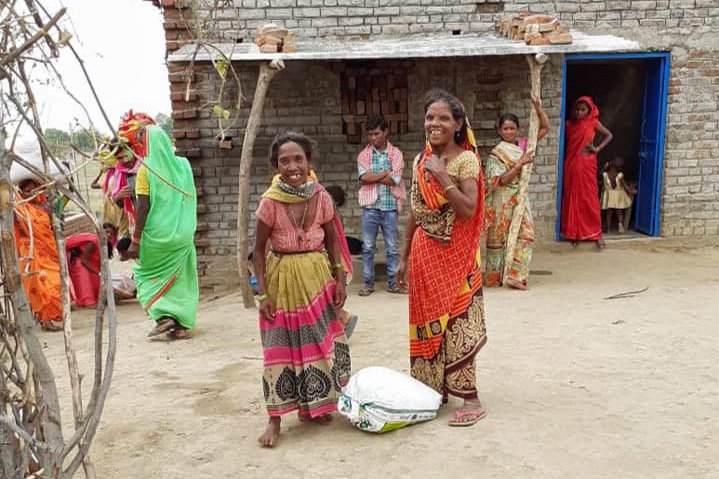
Barachati Village, Bihar State, India, June 2020. Photo by Samten Dolma Bhutia.
After Lama Zopa Rinpoche heard about the food distristribution activities as Root Institute, he offered this message:
Benefits of Charity: Root Institute’s Food Distribution Program during COVID-19
Guru Shakayamuni Buddha said in his teachings that if even a strand of hair is given in charity to a sentient being, for 80,000 eons one will not be reborn in the lower realms and for many lifetimes will be born into auspicious wealth, good health, and fulfilment of wishes due to this action. In the Arya Sanghata Sutra it says one will attain enlightenment by doing the same action. These are the kinds of benefits that are beyond expression and concept.
This food distribution that Root Institute is offering is not just a strand of hair but a variety of food items that are given in charity to the poorest of the poor. So there is benefit beyond expression and concept. When they receive the sacks of food they are extremely happy.
Normally, these kinds of free distributions happen only around local election times. So when we did the food distribution, they were wondering what election was happening. Our food distribution was made across the board, irrespective of the recipient being a Christian, a Muslim, or a Hindu. When the food distribution happened for the first time, we collaborated with the local priests, thinking they might be most familiar with charitable works, but then there was a sense of selective charity toward only those associated with their missions. This did not appeal to us. So after the first distribution we did our own survey to identify the poorest of the poor families, who were extremely happy and appreciative of the help.
We used the school bus for transportation and draped the side of the bus with a huge picture of the Buddha. [Recordings of Rinpoche chanting prayers and mantras were also played over the bus’s speaker.] By merely seeing the image of the Buddha [and hearing the prayers and mantras] they accumulate vast amounts of merit and purified unimaginable amounts of negative karma.
To understand the extent of this merit, it is stated in the Sutra of the Mudra: Entrance to Generating the Power of Devotion that Buddha said, “Manjugosha, a boy or girl of the race, for eons equaling the sand grains of the River Ganga, offers divine food of a hundred tastes and, likewise, divine dress every day to solitary-realizer buddhas equaling the atoms of the whole entire universe, but, Manjushri, any other boy or girl of the race who sees a painting or statue of a buddha collects numberless greater merits. What need is there to mention that anyone who puts their palms together or offers flowers, scent, incense, or lights, [or offering water bowls, Rinpoche adds] collects numberless greater merits than that?” So it is like this, benefitting us from lifetime after lifetime and in dependence upon this we attain the state of Buddhahood.
I also instructed the nuns to participate in the food distribution so that the people can see the robes of a Buddhist and rejoice, and thereby become a condition for them to meet the perfect teachings in their future life—the Buddha’s teaching on the four noble truths, the means to liberation from the great ocean of samsara, for them to have the opportunity to study and practice these teachings, and attain enlightenment. For these benefits, the two nuns went and distributed food.
Thinking from the side of the beneficiaries, these are times of great hardships for them, and help has arrived in their utmost time of need. When we are extremely poor with nothing left to eat and when someone helps us in such a time of need, imagine how extremely happy and appreciative we feel. By this you know exactly what it’s like.
Colophon: Lama Zopa Rinpoche dictated this message in Tibetan to Ven. Tsenla, director of Root Institute, at Kopan Monastery, Nepal, on July 3, 2020. Translated by Ven. Tsenla, edited lightly by Carina Rumrill.
Root Institute center manager Samten Dolma Bhutia writes, “Thank you to everyone who has been helping with this project, including Root Institute staff members Sunil Kumar Manjhi, Arun Paswan, Anil Paswan, Ramananad Das, Lucy Khujur, Lily Kujur, Poonam Devi, Pravin Malakar, Gauri Shankar, Sunil Das, Karan Prajapat, Rupan Manjhi, Binod Kumar, Mehfuz Alam, Raj Kumar, Gopal, Ajay, Kishori, and Ven. Dekyong for looking after Root Institute and for always giving us valuable information and suggestions.
“Thank you to Ladakhi Lama (fondly known as “Baling”), who has been very kind and caring during this time, and Root Institute director Ven. Tsenla for gathering funds to reach out to the poorest of the people affected by COVID-19, for being constantly available, and for guiding us in the work.
“We would also like to thank the villagers who have represented their villages and helped us with our project: Viijay Paswan, Ravindra, Ravi, and Dinesh. Thank you to Tashi-la, Mahakala Cave manager, who has selflessly helped the Root and our staff with food distribution.”
For more information about Root Institute for Wisdom Culture, visit their website:
https://www.rootinstitute.ngo/
- Home
- News/Media
- Study & Practice
- About FPMT Education Services
- Latest News
- Programs
- New to Buddhism?
- Buddhist Mind Science: Activating Your Potential
- Heart Advice for Death and Dying
- Discovering Buddhism
- Living in the Path
- Exploring Buddhism
- FPMT Basic Program
- FPMT Masters Program
- FPMT In-Depth Meditation Training
- Maitripa College
- Lotsawa Rinchen Zangpo Translator Program
- Universal Education for Compassion & Wisdom
- Online Learning Center
- Prayers & Practice Materials
- Overview of Prayers & Practices
- Full Catalogue of Prayers & Practice Materials
- Explore Popular Topics
- Benefiting Animals
- Chenrezig Resources
- Death & Dying Resources
- Lama Chopa (Guru Puja)
- Lama Zopa Rinpoche: Compendium of Precious Instructions
- Lama Zopa Rinpoche: Life Practice Advice
- Lama Zopa Rinpoche Practice Series
- Lamrim Resources
- Mantras
- Prayer Book Updates
- Purification Practices
- Sutras
- Thought Transformation (Lojong)
- Audio Materials
- Dharma Dates – Tibetan Calendar
- Translation Services
- Publishing Services
- Teachings and Advice
- Find Teachings and Advice
- Lama Zopa Rinpoche Advice Page
- Lama Zopa Rinpoche: Compendium of Precious Instructions
- Lama Zopa Rinpoche Video Teachings
- ༧སྐྱབས་རྗེ་བཟོད་པ་རིན་པོ་ཆེ་མཆོག་ནས་སྩལ་བའི་བཀའ་སློབ་བརྙན་འཕྲིན།
- Podcasts
- Lama Yeshe Wisdom Archive
- Buddhism FAQ
- Dharma for Young People
- Resources on Holy Objects
- Ways to Offer Support
- Centers
- Affiliates Area
- Teachers
- Projects
- Charitable Projects
- Make a Donation
- Applying for Grants
- News about Projects
- Other Projects within FPMT
- Support International Office
- Projects Photo Galleries
- Give Where Most Needed
- FPMT
- Shop
Translate*
*powered by Google TranslateTranslation of pages on fpmt.org is performed by Google Translate, a third party service which FPMT has no control over. The service provides automated computer translations that are only an approximation of the websites' original content. The translations should not be considered exact and only used as a rough guide.When I talk of being detached, what I mean is to be simpler, more easy-going. Detachment doesn’t mean totally renouncing everything. It means that you loosen your grip and be more relaxed.







